#ayodhya live
Text
Ayodhya : 1 Of The Most Beautiful Ram Mandir in Ayodhya.
The spiritual resonance of Ayodhya and the architectural marvel of the Ram Mandir, promise an experience that transcends time, inviting everyone to be a part of this extraordinary pilgrimage.
The Beautiful Ram Mandir in Ayodhya
Bloganuary writing promptName an attraction or town close to home that you still haven’t got around to visiting.View all responses
Ayodhya: The Most Beautiful Ram Mandir in Ayodhya Awaits – A Journey Yet to Unfold
Ram Mandir , Ayodhya
In the heart of India, nestled along the banks of the sacred Sarayu River, lies the historic city of Ayodhya, a place…

View On WordPress
#abundance#art#ayodhya#ayodhya dham#ayodhya ghat#ayodhya ka ram mandir#ayodhya live#ayodhya mandir#ayodhya news#ayodhya ram mandir#ayodhya ram mandir construction#ayodhya ram mandir construction update#ayodhya ram mandir inauguration#ayodhya ram mandir live#ayodhya ram mandir news#ayodhya ram mandir song#ayodhya verdict#bloganuary#bloganuary-2024-24#blogging#dailyprompt#dailyprompt-1827#memories#Nature#photography#ram mandir ayodhya#ram mandir ayodhya construction#ram mandir ayodhya construction update#ram mandir ayodhya live#ram mandir in ayodhya
1 note
·
View note
Text
Ram Mandir Inauguration: PM Modi's 10 Empowering Messages
Ram Mandir Inauguration today is a historic moment for India. Prime Minister Narendra Modi delivered a historic address to a gathering of 7000 including devotees, celebs and who is who of society after the Pran-Pratishtha event at the Ayodhya Ram Mandir, marking a significant moment in India’s cultural and religious history.
In his speech, the Prime Minister declared, “January 22, 2024, is not…

View On WordPress
#ayodhya#ayodhya live#ayodhya ram mandir#ayodhya ram mandir inauguration#ayodhya ram mandir live#ayodhya ram mandir news#modi speech#modi speech today#Narendra Modi#narendra modi speech#pm modi ayodhya#pm modi ayodhya speech#pm modi in ayodhya#pm modi speech#pm modi speech today#PM Narendra Modi#pm narendra modi speech#pm narendra modi speech latest#Pran-Prathishta#prime minister narendra modi#Ram Lalla#ram mandir ayodhya#ram mandir ayodhya live#Ram Mandir Ceremony#ram mandir in ayodhya
0 notes
Text
"b-but in ayodhya bjp built airport, roads, sh-" you fucking gobet.
#you fucking idiot those things were built for TOURISTS#not for the people actually living in ayodhya.#for the sake of ram mandir they broke and demolished livelihoods of thousands they also destroyed smaller temples#(decolonisation gang they demolished MANDIRS)#right wingers there is a thing called as logic. please hath jod raha hoon. use it#desiblr#desi tag#sanghi bs#medu rambles#india
84 notes
·
View notes
Text
you know what they say. ram naam satya hai.
#-> myra text#india#indpol#addn ->#voters of ayodhya this is dedicated to you. love you guys.#this is so ironic that the place that started the whole hindutva nonsense rejected bjp this has got to to be the funniest shit ever#but still it makes sense 1800 crores on a temple but you end up displacing the people who live there#for the sake of fucking adani funded five star hotels#today was a surprisingly funny day
13 notes
·
View notes
Note
seventeen garba circle and we kiss in the middle
so true

1 note
·
View note
Text

ટાટા ગ્રુપ ઉત્તર પ્રદેશના અયોધ્યા શહેરમાં મંદિરોનું મ્યુઝિયમ બનાવવા જઈ રહ્યું છે. આ મ્યુઝિયમ 650 કરોડના ખર્ચે બનાવવામાં આવશે. તેમના પ્રસ્તાવને મંગળવારે ઉત્તર પ્રદેશ સરકારની કેબિનેટે મંજૂરી આપી હતી. | Tata Group is going to build a museum of temples in the city of Ayodhya in Uttar Pradesh. This museum will be built at a cost of 650 crores. His proposal was approved by the Uttar Pradesh government cabinet on Tuesday.
#news#latest news#breaking news#live news#news in gujarati#latest news in gujarati#ગુજરાતી સમાચાર#gujarati news#ગુજરાત સમાચાર#તાજેતરના સમાચાર#Gujarati News Headlines#Uttar Pradesh#ઉત્તર પ્રદેશ#Uttar Pradesh news#ઉત્તર પ્રદેશ સમાચાર#Uttar Pradesh latest news#ઉત્તર પ્રદેશ તાજા સમાચાર#Uttar Pradesh breaking news#Uttar Pradesh live news in gujarati#ઉત્તર પ્રદેશ લાઇવ સમાચાર ગુજરાતીમાં#Ayodhya#અયોધ્યા#Ayodhya news#અયોધ્યા સમાચાર#Ayodhya live news#અયોધ્યા લાઈવ સમાચાર#Ayodhya latest news#અયોધ્યા તાજા સમાચાર#Ayodhya breaking news#Tata Group
0 notes
Text
राम मंदिर ट्रस्ट ने जारी की सूचना, कहा, रामलला के दर्शन का नही लगता एक भी रुपया; यहां पढ़ें पूरी डिटेल
राम मंदिर ट्रस्ट ने जारी की सूचना, कहा, रामलला के दर्शन का नही लगता एक भी रुपया; यहां पढ़ें पूरी डिटेल
Ayodhya Ram Mandir News: अयोध्या राम मंदिर में रामलला की प्राण प्रतिष्ठा के बाद बड़ी संख्या श्रद्धालु पहुंच रहे हैं, ऐसे में श्रद्धालुओं को किसी तरह की कोई परेशानी न हो और वो आसानी से प्रभु राम के दर्शन कर सकें, इसके लिए श्रीराम जन्मभूमि तीर्थ ट्रस्ट की ओर से विशेष जानकारी दी गई है.
अगर आप भी रामलला के दर्शन को जा रहें तो ये जानना आपने बेहद ज़रूरी है. इससे अयोध्या पहुंचने पर आपको किसी तरह की…

View On WordPress
#information#no cost#Ram Mandir#ram mandir ayodhya#ram mandir ayodhya live#ram mandir ka udghatan#ram mandir ki hai bari song#ram mandir live#ram mandir news#ram mandir song#ram mandir status#Ram Mandir Trust#ram mandir udghatan#Ramlala#single rupee
0 notes
Text
"Experience the sacred grandeur of Ayodhya's historic Ram Mandir Pran Pratistha Ceremony with live updates.
#Ram Mandir Schedule#Ayodhya Temple Event#Ayodhya Ram Mandir#Ayodhya Ram Mandir LIVE Updates#Pran Pratistha Ceremony
0 notes
Video
PM Narendra Modi inaugurates Maharshi Valmiki International Airport, Ayo...
#youtube#ayodhya ayodhyaairport rammandir pm narendra modipm narendra modi speechpm narendra modi livepm modi liveprime minister narendra modi live
0 notes
Text
𝑵𝒂𝒌𝒔𝒉𝒂𝒕𝒓𝒂𝒔 𝒂𝒏𝒅 𝒃𝒊𝒓𝒅𝒔 𝒕𝒉𝒓𝒐𝒖𝒈𝒉 𝒎𝒚𝒕𝒉𝒐𝒍𝒐𝒈𝒚 𝒂𝒏𝒅 𝒊𝒏𝒕𝒆𝒓𝒑𝒓𝒆𝒕𝒂𝒕𝒊𝒐𝒏
✵ 𝗖𝗿𝗼𝘄 /𝗞𝗮𝗸𝗮
Crow is the animal associated with krittika , pushya , hasta , jyestha , dhanistha
Crows are associated with being the vahan of shani dev , they are a connecting link between the human world and The spirit world , it is believed that our ancestors come in the form of crows to get food and offer us blessings , it is also believed that the caretaker of the crow will achieve blessings from all gods and reach salvation after death
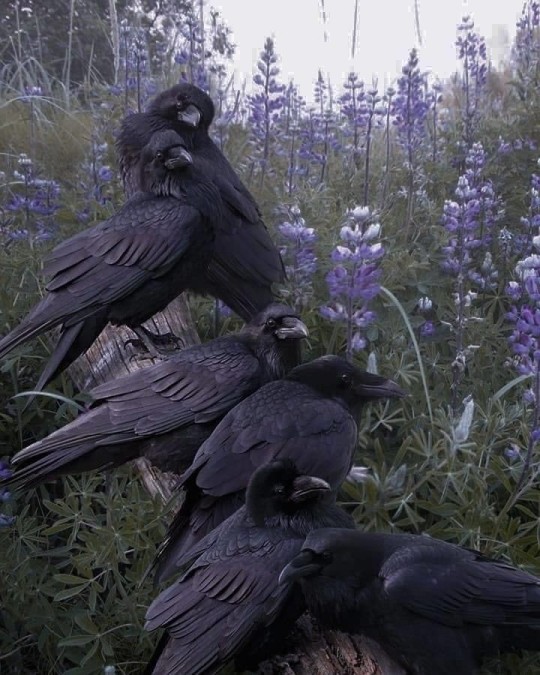
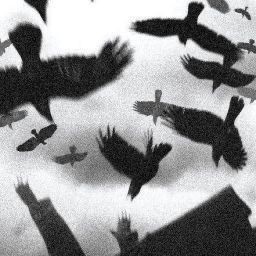
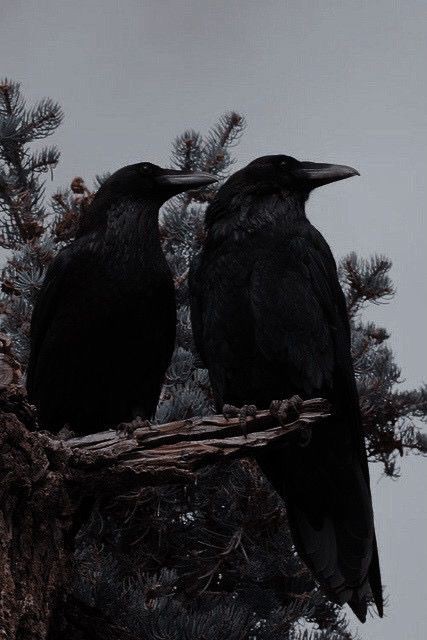
Mythology and lore :
The black crow, also known as a raven in some regions is said to possess clairvoyance by which he can see different worlds,is the tale of KakBhushundi, mentioned in Tulasi’ Das’s epic poem ‘Ramacharitamanas’. Bhusundi who was an ardent devotee of Ram had no respect or devotion for any representation God other than Lord Ram. His guru sage Lomas tried to correct this attitude by teaching him to develop devotion for nirguna brahman or the formless aspect of God. But Bhusundi ignored his guru’s teachings and kept on worshipping Ram as the Ultimate Truth. In a fit of anger Sage Lomasha cursed Bhusundi to become a crow because of his repeated rejection and arguments against the sage’s guidance and advice. When Lord Ram intervened on behalf of Bhusundi, Sage Lomas relented and recalled Basundi who was now in the form of a crow as ‘KakBhushundi’ or Bhusundi the crow and taught him Ramcharitmanas, stories about Rama’s spiritual journey. Thus KakBhusundi in the form of a crow became the ultimate narrator of the events in the life of Lord Rama. He was also blessed with the ability to travel through time and recreate the story of Lord Rama.
He witnessed a cosmic vision in Rama's mouth, observing millions of suns and moons within, and a vision of the sage himself in Ayodhya within each celestial object. He resided within each of these realms for centuries, and returned from Rama's mouth to find himself return to the same moment in time as he had left. Bewildered, he begged for Rama's salvation, and was promptly blessed with the same. He chose to forever remain in the form of a crow as he had been blessed by his favoured deity in that form.
during the shraddha ceremony or oblation offered to ancestors, a ball of cooked rice ( pind) is offered to the dead ancestor. If crows eat ( touch/peck) it, then it is assumed that the dead ancestor’s soul has been released from his or her bindings with the physical body and has embarked on the continuation of the soul’s journey to the next level of existence. In this rite, crows touching the rice ball is considered auspicious and is also seen as a good omen.they are of particular interest in Tantric narratives and Tantric rituals. In the general Hindu context, the crow is often stereotyped as inauspicious and its role limited to that of vāhana (vehicle of a deity). Conversely, in Tantric ritual manuals, the crow’s sphere of influence is based on a broader concept. Such scriptures imply ominous and ‘dark’ aspects of agency in crows, but they do so in a strikingly different way than Hindu classic mythology. Tantra emphasise an ambivalent potential in crows as beneficial to certain rituals and occasionally incorporate a ‘crow potency’ in ritual instructions.
They are the very powerful healers who are able to locate the shadows that create distress for people and bring blind dark spots to awareness in people so healing can ensue. Spending long periods in the dark gives one this Siddhi.Shuni Kah is the Crow of the Dark Moon who has access to the never regions. He is the one in us to bring the eye to the underground sediment that toxifies our lives. If this unresolved sediment it is left in the unseen world there is no healing.Shuni Kah the Crow and gatekeeper to the world of dreams is the grand healer. Just singing his name is a powerful mantra that causes us to see in the dark.
The entrance to Shuni is through the femminine. His Mother is Chaya, the Shadow Woman, and his father is Surya, the Sun. His Mother was not able to realise her power beside her Husband, the sun, for his glow burned and make her feel overwhelmed and insignificant and so she fled leaving behind her shadow.This signifies how the Feminine is brought into insignificance when the Solar or active force is ruled over her.Having left her Shadow with her husband, Shuni’s mother whilst still pregnant performed prayers and yogic austerity to Shiva under intense heat. Her effort was so great and the heat generated became so hot that her child, Shuni, was burned black.This signifies how heat and tapasya (yogic purifying Fire of austerity) reveals the darkness within the unconscious recesses of one’s being.When Shuni was born and seen in his blackness, his father was shocked at how dark he was refused to recognise him as his child, accusing his wife of being unfaithful. He raged greatly and insulted his wife. Seeing his Mother thus insulted raised Shuni’s wrath. Thus Shuni’s gazes is ever down in the underworld and arouses suffering.He Rides on the Crow and his wife rides on the Swan.One is the bird of the underworld and the other is the bird of the Celestial spheres
The completion of Tantrais known as the Kiss of Crow & Swan.The meeting of opposites.She rides a chariot pulled by crows and has a flag with crow emblem (Kak Dwhajini). She has a voice of howling jackals. Dhumavati
In Celtic mythology, the warrior goddess known as the Morrighan often appears in the form of a crow or raven or is seen accompanied by a group of them. Typically, these birds appear in groups of three, and they are seen as a sign that the Morrighan is watching—or possibly getting ready to pay someone a visit.
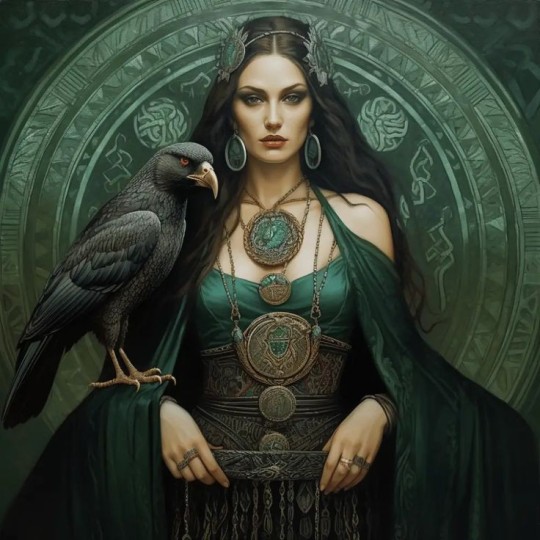
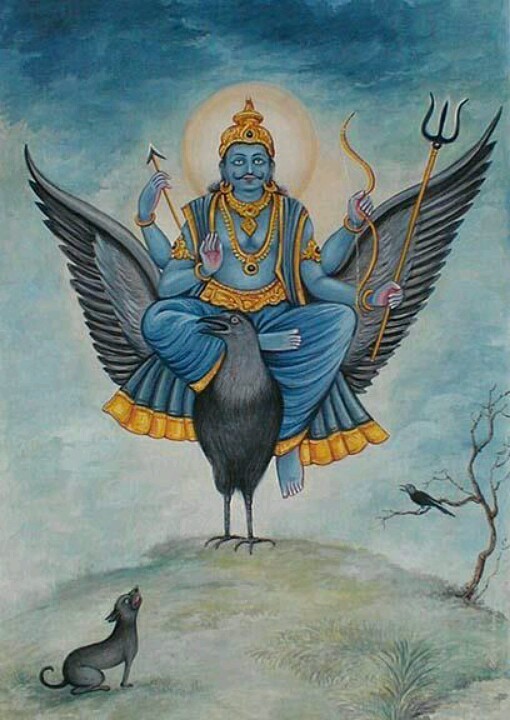
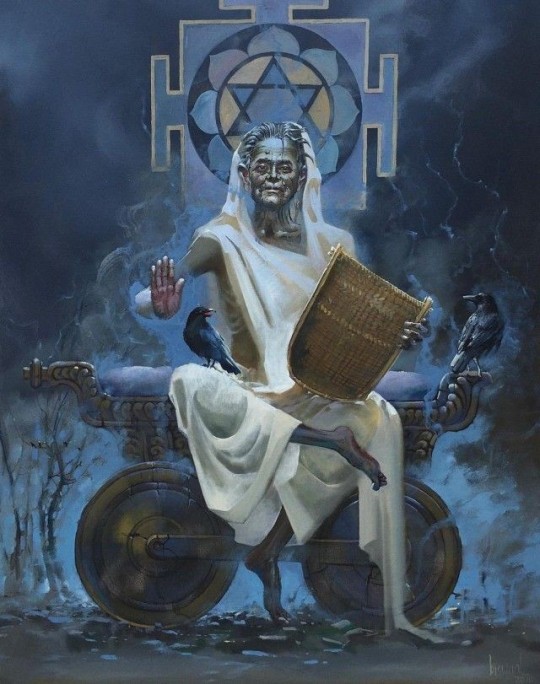
In some tales of the Welsh myth cycle, the Mabinogion, the raven is a harbinger of death. Witches and sorcerers were believed to have the ability to transform themselves into ravens and fly away, thus enabling them to evade capture.Odin is often represented by the raven—usually a pair of them. Early artwork depicts him as being accompanied by two black birds, who are described in the Eddas as Huginn and Munnin. Their names translate to “thought” and “memory,” and their job is to serve as Odin’s spies, bringing him news each night from the land of men. For the ancient Greeks, the crow was a symbol of Apollo in his role as god of prophecy. Augury—divination using birds—was popular among both the Greeks and the Romans, and augurs interpreted messages based on not only the color of a bird but the direction from which it flew. A crow flying in from the east or south was considered favorable.Genesis tells us that after the flood waters receded, the raven was the first bird Noah sent out from the ark to find land. Also, in the Hebrew Talmud, ravens are credited with teaching mankind how to deal with death; when Cain slew Abel, a raven showed Adam and Eve how to bury the body, because they had never done so before.Philo of Alexandria (first century AD), who interpreted the Bible allegorically, stated that Noah's raven was a symbol of vice, whereas the dove was a symbol of virtue (Questions and Answers on Genesis 2:38)In the Story of Bhusunda, a chapter of the Yoga Vasistha, a very old sage in the form of a crow, Bhusunda, recalls a succession of epochs in the earth's history, as described in Hindu cosmology. He survived several destructions, living on a wish-fulfilling tree on Mount Meru.[24]
The Lesser Key of Solomon: Goetia, The Book of Evil SpiritsStolas, the 36th demon in the pantheon, will first appear as a raven when summoned. Once he becomes a man, he teaches the arts and astronomy, as well as the properties of precious stones and the healing properties of herbs. Malphas, the 39th demon, appears as a crow and won’t change form until ordered. In his human form, he can build homes and fortifications and can give his summoner a familiar
Raven overheard the old man talking to himself about a box he possessed. The box contained a series of ever-smaller boxes, and inside the smallest box was all the light in the world—which Raven decided to steal.There seemed to be no door into the house, so Raven waited until the man’s daughter went to a nearby stream, then changed himself into a hemlock needle in the water, which the girl drank. Raven changed himself into a baby once he was inside her, and once he was born (an odd-looking half-bird, half-boy creature whose true nature was hidden by the darkness), he demanded to be allowed to play with the boxes. One by one, Raven demanded the first box, then the second, and so on. Finally, he convinced his grandfather to open the innermost box and let him play with the ball that was the light. As soon as Raven had the light, he took off with it gripped in his beak.The light spilled from the ball and over the world, but it wasn’t long before Eagle gave chase. As Raven fled, pieces of the light fell to the ground and shattered, bouncing back into the sky to create the Moon and the stars. Other pieces of the light slowly fell as Raven made his way around the world, which is why the light travels across the sky the way it does.Theories suggest that the three legs represent the three ancient clans of Japan or the three virtues of valor, benevolence, and wisdom. Some suggest that the three stands for mankind, heaven, and Earth. Regardless of why Yatagarasu has three legs, he’s seen as symbolic of the navigator, physical and spiritual, and he’s even been adopted by the Japanese soccer association in the hopes that he’ll help navigate the ball into the goal. He’s also closely associated with Kumano, the birthplace of the founder of the sport in Japan
The raven is considered one of the smartest birds. In fact, the raven’s brain is among the largest of any bird species. Ravens also happen to possess an extraordinary number of brain cells compared to the brains of other birds.3When the raven is your spirit animal, you are being called upon to rely on your wits in a given situation or when you are faced with a challenge in your life. Often in life, we can go on automatic pilot, accepting things the way they are, or thinking we don’t have the capacity to change them.The raven spirit animal tells you that with innovation and creative thinking, you can influence outcomes that affect the course of your life. Even if you feel emotional about a situation, remember to rely on the gift of your intellect to solve your problems. This is how you gain deeper intelligence and wisdom.\
Charles Dickens’ Barnaby Rudge: A Tale of the Riots of Eighty. In both tales, the raven is at first disturbing to the character who interacts with him. But then he provides important insights. Indeed, the raven expands both of the main characters’ level of consciousness.
In many Native American legends, the raven is the wisest of birds, even possessing the ability to speak.8 (In fact, this is an interesting parallel between Native American legends and stories from other cultures, such as Edgar Allan Poe’s The Raven, in which the intelligent black bird is capable of human speech.The Egyptian goddess Nepthys, who is the sister of Isis, was the goddess of the dead.13 It’s clear that the ancient Egyptians also connected the raven with death, as they associated Nepthys with this intelligence black bird.
Meaning: Survival and Adaptability
Intuition – Because the raven is so closely associated with clairvoyance and prophecy, on a spiritual level, they remind us of our own ability to connect with our Higher Power and higher spiritual entities through our own minds.
Spiritual Guidance – As they are associated with insight and guidance, the raven is also a symbol for spiritual education. We are all works in progress. Learning about spirituality from more enlightened souls can lead to our own spiritual growth.
Spiritual Transformation – As a powerful symbol of transformation, the raven also embodies the idea of shifting consciousness and opening our minds to greater awareness as we navigate our spiritual journey. reflect on the areas of your life that they might relate to. Even an anxious raven dream can be a gift. It can prompt you to take the time to be an objective observer of your own thoughts. Then, you can improve situations without getting pulled in every direction your thoughts might take.
Sources :
1 2 3
Through various nakshatras
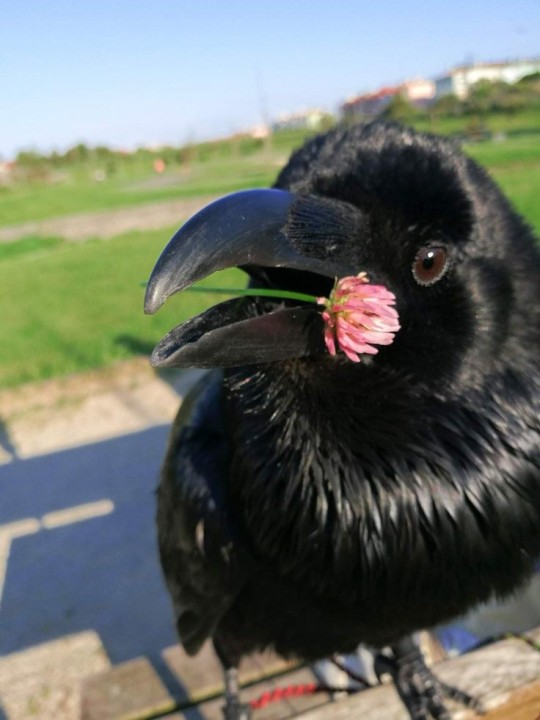
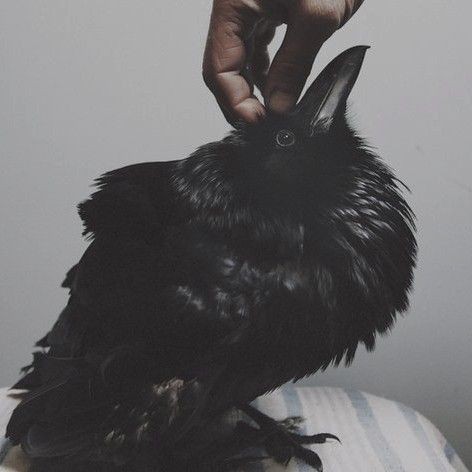
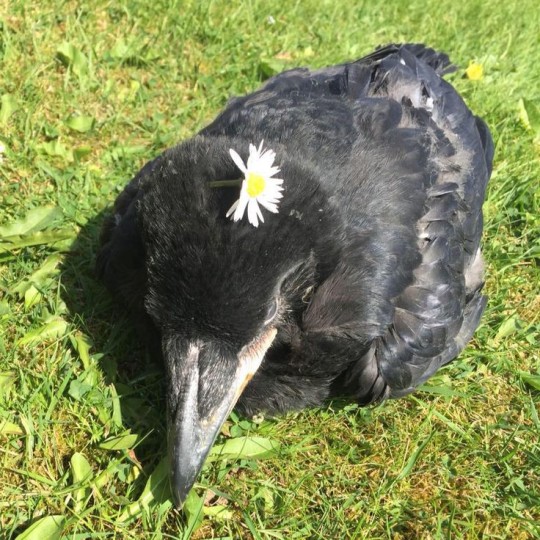
Interpretations are solely based on my understanding and you can have your interpretation as well ❤️
Krittika nakshatra
Krittika is a churner of perfection under the fire of Surya that gave birth to Shani through his mother chaya the first conception of the birth of a crow comes through while Shani is associated with crows , the struggles of not being seen enough is associated here , the outcast themes come through. Along with that the perfection theme while a crow collects the most beautiful stuff to keep in it's nest , it knows what's valuable like krittika sees the value in things , they know what they want and they attempt to take it . Here this relates to the story of yatagarasu believed to be an incarnation of the sun in Shinto mythology. This also associates with Apollo being the god of prophecy and taking the form of a crow , shows that where there exists light ( Surya ) there Exists chaya , they aren't on a scale of horizontal extremes but the flip sides of a coin, one cannot exist without the other , in krittika lies the light so lies the dark , lies the beauty of creation so lies the pain of change .
Pushya nakshatra
Pushya nakshatra ruled by Saturn comes in through the first liberation through pain and trials in the lives of the natives , like a crow one suffers despite what others say , people say various things without knowing about the wisdom of the crow , this forms the initiation of intuition . While pushya relates to the nourishing aspect of a crow , how they hunt for their young ones , how they know pain because they have been the one experiencing it , being outcast only affects them for a small time because they pick themselves up like a true winner. . Here the intelligence and creativity given by the raven shines through with the light of the moon .
Hasta nakshatra:
The playful nature of mercury- moon shines through the crow in being a lover for finer things in life , they are the intelligent ones the smart ones , they are often called deceptive , but that's just cleverness put to use , while the significance here can be seen through the story of raven (mentioned above) stealing the box which contained all the light of the world and convincing the old man to open the box , natives have great communication skills and can easily convince people. As the eagle chased the raven the moon and the stars were created , signified by the moon hasta creates their own pathway through their own efforts. By hook or by crook they get what they desire .
Jyestha nakshatra:
In Jyestha nakshatra comes in the prophetic and astrological nature of the natives . Jyestha nakshatra is associated with the 8th house , hence death and through the mahavidya Dhumavati who is also associated with crows , this nakshatra gives grounding, astrological talent to the one with this nakshatra. When the ceremonial rites of a dead person is performed offering food to a crow suggests the offerings being accepted by the dead , which is suggested here with Jyestha being in Scorpio. In tantra crows are seen as potent symbolism of intuition and transformation in various mythologies, crow is seen as transformation as is seen in Jyestha nakshatra.In the lesser key of solomon a crow reaches the art of divinitions and healing properties of crystals . A Jyestha native transforms throughout their lives and gains knowledge to become a spiritual centre of creativity and intuition. They bring in spirituality and astrology as 8th being the origin of astrology, they are potent in magical arts and healing others as well as themselves.
Dhanistha nakshatra :
When in dhanistha can be explained through the story of kakbhushundi , the disciple who turned into a crow in devotion to Rama , the solar avatar of Vishnu, kakbhushundi explores the spritual aspect of the crow , kakbhushundi who recited stories through ramacharitamanas . Dhanistha associated with Hanuman also shows the infinite devotion the crow bird and the natives of dhanistha have towards their adored and admired one , being a symbol of loyalty they are blessed with spiritual powers like kakbhushundi could travel through time and various realms , Dhanistha are blessed with the power to see various perspectives . Dhanistha natives are associated with the celestial form of a crow , the loyalty , the devotion and the spiritual salvation.

Thank you so much for reading, I hope this thread provided you valuable insights, please know that this is based on my understanding and interpretation I'm open to suggestions and corrections
Have a great day / night ahead 🤍
#vedic astrology#sidereal astrology#astrology#astro community#astrology readings#astrology community#krittika#hasta nakshatra#jyestha#pushya nakshatra#dhanistha
409 notes
·
View notes
Text
DAY 5930
Jalsa, Mumbai May 13/14, 2024 Mon/Tue 1:19 AM
🪔 ,
May 14 .. birthday love and wishes to Ef Snehal Rajpal from Ahmedabad .. Ef Shivani Arora from Chennai .. and Ef Shital Shelke from Amravati .. stay safe .. 🙏🏻🚩❤️
Birthday EF - Sandhya and Wed Ann with Santosh Ef husband ..
Tuesday, 14 May .. love blessings and happiness ..वैवाहिक जीवन की जयंती, सुख शांति, और स्नेह 🙏 स्नाध्य - संतोष
... the night pages at this hour open to the pages of the Ramayan रामायण and words that reflect moments on the return of Shri Ram from his 'banvaas' राम वनवास, .. which under the aegis of the English language would be represented as an exile .. but it cannot be addressed such .. the 14 years were the purity .. and the description in the Ram Charit Manas .. राम चरित मानस, as he reaches Ayodhya and the description of it .. and the clarity of the purity of the Saryu River that flows by it , are spellbinding ..
and then shifted my glance to the books that lie beside me - Babuji's - and the literary evaluations done by those that have done PhD's on it .. and reflections of his mind and the understanding of the deeper philosophy behind each verse , is so engrossing ..
The night does not matter .. the time be not of value .. the mind and the reason of its desire to be there and nowhere else is prime ..
But .. time is the essence .. its need to be availed is the bigger essence .. and to devote the time for the mind - not mine but of them that seem to want to understand is the essence - is the prime time ..
Prime Time .. haha .. TV vocabulary creeps in so surreptitiously .. never in its meaning here ..
I desire .. to put in more of it on the post ..
But we all live in a World that is dominated by thoughts completely unrelated to the subject or the text .. and the prudent prudence decides to evade rather than swim dunk and paddle away to the shores of safety ..
What weak moment be this .. sad ..
Isolated in the genuineness of the genuine ..!!!
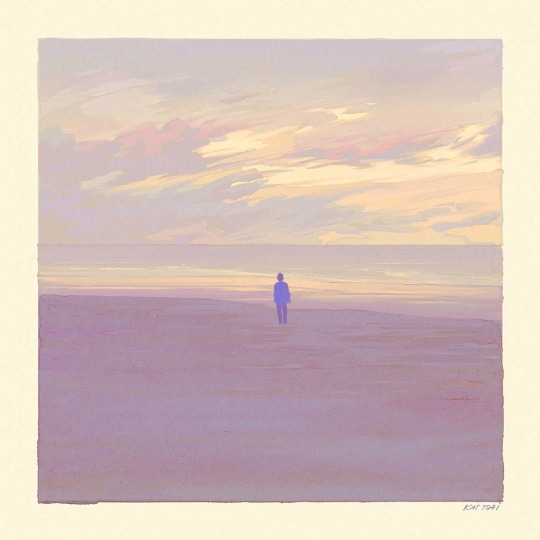

Amitabh Bachchan
104 notes
·
View notes
Text
Ayodhya : 1 Of The Most Beautiful Ram Mandir in Ayodhya.
The spiritual resonance of Ayodhya and the architectural marvel of the Ram Mandir, promise an experience that transcends time, inviting everyone to be a part of this extraordinary pilgrimage.
The Beautiful Ram Mandir in Ayodhya
Bloganuary writing promptName an attraction or town close to home that you still haven’t got around to visiting.View all responses
Ayodhya: The Most Beautiful Ram Mandir in Ayodhya Awaits – A Journey Yet to Unfold
Ram Mandir , Ayodhya
In the heart of India, nestled along the banks of the sacred Sarayu River, lies the historic city of Ayodhya, a place…
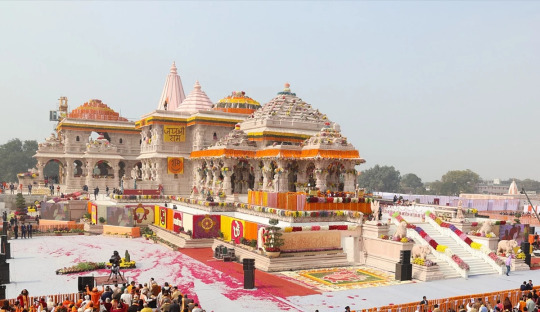
View On WordPress
#abundance#art#ayodhya#ayodhya dham#ayodhya ghat#ayodhya ka ram mandir#ayodhya live#ayodhya mandir#ayodhya news#ayodhya ram mandir#ayodhya ram mandir construction#ayodhya ram mandir construction update#ayodhya ram mandir inauguration#ayodhya ram mandir live#ayodhya ram mandir news#ayodhya ram mandir song#ayodhya verdict#bloganuary#bloganuary-2024-24#blogging#dailyprompt#dailyprompt-1827#memories#Nature#photography#ram mandir ayodhya#ram mandir ayodhya construction#ram mandir ayodhya construction update#ram mandir ayodhya live#ram mandir in ayodhya
1 note
·
View note
Text
Hey Guys I made this Story that's based on The Ancient Indian Tale of Prince Rama and Princess Sita and the Ten Headed Demon Ravanna but I made it different with the Characters like: Prince Mordecai and Princess Samantha, Ravanna, Hanuman, Bharata, Indrajit, Manthara, Surpanakha, Queen Kaikeyi (Prince Mordecai's Jealous Stepmother)




THE STORY OF MORDECAI AND SAMANTHA:
Once upon a time, in the magnificent kingdom of Ayodhya, there lived a noble prince named Mordecai, beloved by all for his wisdom, courage, and kindness. He was the heir to the throne, destined to rule alongside his beloved wife, Princess Samantha, a woman of unparalleled beauty, grace, and compassion. Their love was the envy of all who beheld it, and their kingdom flourished under their benevolent rule.
However, their happiness was not to last, for lurking in the shadows was the wicked ten-headed demon, Ravanna, whose heart burned with jealousy and malice. Ravanna coveted Princess Samantha for himself, and he plotted to separate her from Prince Mordecai and claim her as his own.
Mordecai: "My dear Samantha, our love is like the eternal flame, burning bright amidst the darkness. Fear not, for I shall always protect you, my beloved."
Samantha: "Oh Mordecai, my heart sings with joy at your words. Together, we shall overcome any obstacle that dares to challenge our love."
One fateful day, as Prince Mordecai and Princess Samantha were taking a leisurely stroll through the enchanted forest that surrounded their kingdom, they came across a wounded deer lying in agony. Princess Samantha's compassionate heart was moved with pity, and she beseeched Prince Mordecai to help the poor creature.
Samantha: "Mordecai, look! A wounded deer lies in distress. Please, we must help it."
Mordecai: "Fear not, my dear Samantha. I shall use my magic to create a protective circle around you. As long as you stay within its bounds, no harm shall befall you."
That night, as Princess Samantha rested within the safety of the magic circle, she heard a terrible cry echoing through the forest. Believing it to be her beloved Mordecai in grave danger, she rushed to his aid, unaware of the treacherous trap that awaited her.
Samantha: "Mordecai! I hear cries of distress! I must go to him at once!"
Mordecai: "No, Samantha! Stay within the circle! It is not safe!"
But it was too late. Ravanna, with his dark magic and deceitful wiles, had disguised himself as Prince Mordecai and lured Princess Samantha out of the protective circle. Seizing her in his powerful grasp, Ravanna vanished into the depths of the forest, leaving behind naught but despair and heartache.
Ravanna: "Foolish princess, to trust in the illusion of safety. Now you are mine, and no one shall stand in my way."
Prince Mordecai, upon discovering his beloved Samantha missing, was consumed with grief and fury. Determined to rescue her from the clutches of the vile Ravanna, he embarked on a perilous journey, aided by his loyal companions, including the mighty monkey warrior Hanuman, the valiant prince Bharata, and the wise sage Vishwamitra.
Hanuman: "Fear not, Prince Mordecai, for I shall lend you my strength and my cunning. Together, we shall vanquish the foul demon Ravanna and rescue Princess Samantha from his grasp."
Bharata: "My lord, I pledge my sword and my loyalty to your cause. Let us march forth and bring justice to the wicked."
Vishwamitra: "Prince Mordecai, the path ahead is fraught with danger, but with courage and determination, you shall prevail. Trust in your heart, and victory shall be yours."
And so, Prince Mordecai and his companions embarked on a perilous quest, braving treacherous jungles, raging rivers, and dark caverns in their relentless pursuit of Ravanna and his captive, Princess Samantha.
Along the way, they encountered many trials and tribulations, including battles with Ravanna's fearsome minions, such as his son Indrajit, the demoness Surpanakha, and the wicked maid Manthara, who sought to thwart their noble quest at every turn.
Indrajit: "You dare to oppose my father, Ravanna? Prepare to face the wrath of Indrajit, the mighty warrior prince!"
Surpanakha: "Ah, Prince Mordecai, how handsome you are! Why waste your time on that insignificant princess when you could have a powerful demoness like me at your side?"
Manthara: "Princess Samantha is a threat to my mistress's ambitions. I shall do everything in my power to ensure that she remains in Ravanna's clutches forever."
But through courage, perseverance, and the power of their unwavering love, Prince Mordecai and his companions overcame every obstacle that stood in their way, drawing ever closer to their ultimate goal of rescuing Princess Samantha from the clutches of Ravanna.
At long last, after a fierce and epic battle that shook the very foundations of the earth, Prince Mordecai confronted Ravanna in his fortress atop the towering mountain of Lanka, where Princess Samantha was held captive.
Mordecai: "Ravanna, your reign of terror ends here and now! Release Princess Samantha, or face the wrath of a righteous prince!"
Ravanna: "Foolish mortal, you dare to challenge me? I am Ravanna, the Lord of Lanka, the most powerful demon in all the realms! You are no match for my might!"
But Prince Mordecai, fueled by his love for Princess Samantha and the strength of his noble heart, fought with a courage and determination that knew no bounds. With the aid of his allies and the blessings of the gods themselves, he clashed with Ravanna in a battle that shook the heavens and the earth.
In the end, it was not the strength of arms or the power of magic that determined the outcome, but the purity of Prince Mordecai's love and the righteousness of his cause. With a final, mighty blow, he vanquished Ravanna and rescued Princess Samantha from the darkness that had ensnared her.
Mordecai: "Samantha, my beloved! Are you hurt? Fear not, for you are safe now, and I shall never let harm befall you again."
Samantha: "Mordecai, my hero! Oh, how I have longed for this moment! With you by my side, I fear nothing, for our love is stronger than any magic or malice in the world."
And so, Prince Mordecai and Princess Samantha returned triumphantly to their kingdom of Ayodhya, where they were greeted with jubilation and celebration by their grateful subjects. Their love had been tested and proven true, and together, they ruled wisely and justly for many years to come, a shining beacon of hope and inspiration to all who beheld them.
THE END!!
I Hope you guys liked it 😊🥰
For: @fxe4596 , @nicomxm23 , @mordorigs , @jgquintelslut , @pinkcandycatmakesart , @anifaz , @isrrael120 , @notadumbdog , @martingeekermmd , @eeveepalooza , @apollothedeity, @sidoresca, @siinhorhy, @insomniacz, @rhyliethecaterfly , @yeetafry, @at-weeb96, @kiwithekool11437, @kiko2032, @orchestralauthor, @untitled14360, @loudlyhappycupcake
#samantha 80ssuperstar#samantha feliciano#samanthafeliciano#samantha 80s superstar#80ssuperstar#regular show#regular show fanart#mordecai#mordecai regular show#regular show mordecai#jg quintel#india#india stories#ancient india#Ancient Stories#fantasy#indian#india love#indian literature#ancient cultures#make believe#stories#story#fan story
62 notes
·
View notes
Text
Devi Sita (Goddesses, Rishikas & Women)
Spring had passed away with blooming lotuses, mating birds, and the call of the koel. Sita, who adored Vasanta out of all seasons, had to spend the most romantic season in captivity by the fearsome ruler of Lanka.
Not one day went by when Sita could breathe in peace. After turning down his advances, Ravan, in a thundering voice, ordered Sita to be sent to Ashok Vatika and to be continuously tormented every day, every moment, until her strong will breaks.
The Rakshasa clan is a merciless one. Their females, the Rakshasis, even more. Their ruthlessness and barbaric ways are known to strike terror in the hearts of people, and ascetics have always been troubled by their repeated assaults.
The Rakshasis, as per the orders of their king, spent no moment to torment Sita. From throwing icy cold water to wake the drowsy Sita to butchering meat in front of her, on some days where they wanted to play with Sita’s emotions a little more, they would narrate how Ravan would butcher Ram’s flesh in front of her.
Spring passed into summer. The humid climate of Lanka made Sita perspire immensely. Sweat clung to her skin, and the sun shone brightly on the fair princess, who sat silently under the shade of one of the Ashoka trees, her mind constantly thinking about the whereabouts of Rama and Lakshman. The summers were brutal for Sita. Though she had spent so many years in the deep forests, she did have plenty of fresh fruits and water to nourish herself, unlike her situation in Lanka.
The Rakshasis starved her, dehydrated her to a great extent, and laughed when one fiery afternoon she fainted. Only when the Lankan queen Mandodari arrived to visit Sita did the queen strictly order food and fresh water to be brought to Sita.
If the days were filled with terror and threats, the nights, though spent alone, were filled with nightmares for Sita, who often woke up screaming Rama’s name, only to feel the cold, gusty wind brush her slender flesh and the rocky bed under the tree where she took shelter.
Yet, Sita, despite all her mental and physical wounds, always admired the beauty of Ashok Vatika. The clear lakes filled with exotic blooms and beautiful sculptures in dancing poses reminded her of Ayodhya. Marigold bushes reminded me of Mithila. The serene fragrance of the yellow and orange flowers made her fondly think of the garlands she wore around her arms and feet in Panchvati. Sita rarely smiled in the picturesque garden. She never got the chance to sit there happily, but there were rare moments in the company of the lush trees and flowers, like one day when a few squirrels nuzzled to her and she smiled truly and lovingly at the small, adorable creatures.
But living beings are capable of sympathy and pity, even for a brief moment at least, but pity and compassion do arise in their hearts. It could be out of guilt or maybe an honest realisation of their crude actions, but somehow, compassion comes out, and the stony hearts of the Rakshasis did melt a little with the cold, stormy showers of monsoon in Lanka.
One night, a raging storm blew by Lanka. The howling winds had extinguished the fiery torches that lit the gardens and courtyards of the grand palace. The Rakshasis too ventured inside to take cover while a frail Sita sat beneath the same Ashoka trees, knees huddled together and arms across her chest with chattering teeth as the torrential rains pelted against her lithe body and her surroundings.
One of them, named Ratangi, combed through her wet, curly hair when her eyes fell on Sita. Sita, who with each day appeared thinner, her lustrous and radiant face etched with greyness and dry texture, signs of ill-health and despair, sat with her eyes closed and her dry lips muttering the name of Rama. Though Ratangi and her companions sat afar, they could read the familiar movement of Sita’s lips to decipher Ram’s name.
Ratangi had pointed to another companion and pointed at Sita. The other Rakshasi rubbed her eyes and said, “She is the enemy, but it would be a lie if I said that I don’t admire her resilience. So many months have passed by, with no sign or message sent by her husband, yet she is steadfast in her belief about him. Such immense strength is admirable indeed.”
Ratangi’s eyes softened towards Sita. Her thick, bushy eyebrows came together in a frown as she said, “Don’t you think we should help her? The storm is brutal, and she is already so thin and frail. It will kill her.”
The other Rakshasi nodded at Sita’s condition but questioned, “What about the king’s orders? And if by any chance the princess gets to know that we have helped her, we will be punished.”
Ratangi dryly commented. “The princess enjoys tormenting this poor woman. She derives a sick joy from it.”
The rain mercilessly pelted the concrete grounds of the gardens. Some of the large ornamental trees had been bent down to combat the rain and winds. Ratangi and her companions looked at each other’s faces and then back at Sita, who had started shivering, but not once did her lips stop uttering Rama’s name.
Ratangi got up in desperation. “This woman doesn’t deserve to die in such a pitiful way. I am getting her over here.”
Gathering a straw hat kept against a wall, she quickly leaped to Sita with large strides and picked her up when the familiar sound of anklets made Ratangi halt in her steps.
“Maharani Mandodari.”
Mandodari, the chief queen of Lanka, stood in the harsh, stormy rain without a cover. She looked at the petite Sita in Ratangi’s arms and caressed Sita’s forehead. “We are all going to pay for this sin.”
Ratangi’s eyes lifted back to the queen, who stood with a passive expression on her face. Mandodari simply said, “My husband doesn’t strictly monitor Sita’s health or her lifestyle here. I can’t free Sita, but as a woman, I can make her life a little easier.” Checking for Sita’s pulse, Mandodari continued, “Sita is to be nursed back to health with treatment by our royal physician. None of the Rakshasis are to be engaged in troubling Sita any longer. Do your guard duties, but none of those sick illusions and cruel remarks. I can’t stop Shurpanakha, but make sure that none of the Rakshasis join her to make Sita’s life worse than hell any longer.”
Ratangi and Mandodari walked to bring Sita inside to provide some warmth to her body. “We have performed enough sins that we have the noose of Yama hanging around us. Let’s leave behind some good deeds, at least for the queen of Ayodhya.”
And from that stormy night on, Sita’s life in captivity in the lovely garden of Lanka improved. She was fed the juiciest of fruits, nutritious grains, and pulses, and nobody ever served her murky water to drink. The Rakshasis sometimes gave some of their garments to Sita, who graciously accepted a few of them.
***
“Why are you still hell-bent that your Rama will free you? Don’t you know Ravan has captured so many powerful warriors and hasn’t even spared the gods too?” Ratangi cries out to Sita, who sits as peacefully as a sage immersed in meditation.
“I am not afraid of death, Ratangi, or my husband. I know Rama, but you don’t. He is kind as a dove, but when in rage, he becomes the destroyer himself.”
Some moments ago, Ravan arrived at the garden to threaten Sita to submit to him. “If you don’t submit to me, O Sita! You will meet with terrible destruction at my hands after a month! This very day, a month from now, I shall devour you."
Sita, who had enough of Ravan’s violent and intimidating threats, especially after the cruel incident where Ravan showed the beheaded Rama to Sita to break her mind, silently challenged Ravan’s final warning with a fixed, fiery gaze.
Ratangi and a few other Rakshasis who had grown to like Sita grew terrified at Ravan’s threat. After the Lankan king left the garden, they rushed to Sita and sat around her feet.
The afternoon sun drenches the entire garden in golden light. The large trees cast dark shadows on the ground, but unlike the hot winds of summer that pricked everyone, the cool winter breeze brings a pleasant sensation to Sita and all the other Rakshasis in the garden.
Sita, in her tree bark garments and long cotton scarves, looks at the shimmering water of the lake. The swans bask under the sun, their eyes closed, as if enjoying the warm company of the sun. Sita smiles and keeps a cheek on her eyes as a small smile curves on her lips.
Ratangi, however, finds no peace, unlike Sita. She asks, “How can you sit so calmly? You only have a month to live. You don’t even accept our help to cross you over to your land. Even if Rama and your brother-in-law Lakshman cross the ocean, how will they penetrate the defences of our kingdom?”
Some months ago, Sita would always sit morose. Shurpanakha never left any chance to insult Sita or scare her with brutal images of Rama’s death. But Sita was a courageous princess, a woman with the resolute determination to survive all odds.
‘My Raghunandan will fight even the gods for me. He is my strength, and I am his. He will fight on the battlefield with your king soon and take me away. And my battle is here in this garden, all alone. I keep winning every day, and I know Rama will avenge me soon. Ravan’s pot of sins is overflowing.’
The other guards gasp. Sita calmly, with a brave look in her eyes, looks at no one but the calm lake. Sita’s words were blasphemous!
Ratangi and her companions look at one another. Astounded at Sita’s indomitable spirit, they closed their eyes and prayed to fate, for they seldom believed in the celestials above to bring Sita and Rama together, at least for one last time.
And what’s a king without his loyal people and followers? Ratangi and her companions grew kind and stretched a hand of friendship to Sita, but in battle they would side with their emperor. A sign of true and maybe flawed loyalty in terms of the ‘greater good’.
Nobody speaks a word. Sita no longer looks at the crushed flowers beneath her feet, but her eyes always fall on the loveliest of flowers that bloom in the garden. The cold doesn’t bother her anymore, and she gladly welcomes the sun on her body.
It’s only a matter of time, and like a lion, will my Rama take me away from here?
A chain of events brought about the ominous sign of Lanka’s destruction. Ravan’s soldiers, servants, and all the guards, Rakshasas and Rakshasis, try their level best to douse the fire burning away their kingdom like a raging forest fire.
Ratangi notices the blazing look in Sita’s doe-like eyes and gulps. The entire Ashok Vatika, too, burns. The dry twigs and leaves serve as fuel to let the fire capture everything in its vicinity. Sita stands on the concrete platform, her head high, and for a brief moment, she sees Hanuman leap across the large roofs of the palace with a fiery grey trail in the sky.
Flames surround Sita, and though she has seen endless fires in her nightmares, this time her face bears a glow as radiant as the enormous orange flames around her. She braces the powerful heat emanating from the fire and draws her eyes close once again with her lips, remembering Rama’s name like the chants of a mantra.
Sita’s open hair flying in the strong winds and the fiery radiance of her face make her appear like Devi Durga, and never did Ratangi think about bowing to another woman except the royal ladies of Lanka. Her head bends down automatically in reverence, fear, and awe at Sita.
Ratangi had seen Sita as the delicate doe-like princess when she was brought to Lanka. She saw how Sita was the rightful queen of Ayodhya after displaying her firm grit to survive and to stay stable after months of mental and physical torment, and tonight Ratangi saw Sita look like a powerful goddess of destruction.
She only mutters one statement after witnessing the surrounding flames destroy everything in their wake. “Lanka is doomed.”
--- xxx ---
The last second chapter of my short story collection titled, Goddesses, Rishikas & Women. There are other stories, some that you all have read, and the rest shall be revealed later in the future.
This scene is my imagination of Sita in Ashok Vatika. I hope I could do some justice to Sita's character.
And if you want to find more updates about this book, you can head over to my id: @samridhi.writes for all book updates and excerpts (meko audience bannani hai apni vahan so you all would mean the world to me 🥹💗💖)
Taglist: @swayamev @jukti-torko-golpo @navaratna @kaal-naagin @alhad-si-simran @houseofbreadpakoda @inexhaustible-sources-of-magic @krishnaaradhika @krsnaradhika @ramcharantitties @krishna-priyatama
68 notes
·
View notes
Text
i have got 5 anons in my inbox talking about how the people in ayodhya were encroaching on government land and so the government had every right to throw them out and use that land for the temple. and like do y'all really think encroaching and living illegally on government land is anyone's first choice??? do y'all really believe that the best way to go about this is to demolish their houses and make them homeless??? to take their livelihoods and push them further into poverty??? because if yes, then i am sorry but there's nothing that can be done.
23 notes
·
View notes
Note
May I request another prompt, this time Ramayana??
Where after Sita's bhumi pravesh, Luv -Kush live at Ayodhya's palace. They are merely 8, feel scared at this new place and battle resentments against their father for abandoning their mother. Who love their mother but are angry at her for forsaking them. Grappling with loss of their familiar forest and pleasures of simple lives, find the city walls strangling them.
Hi there, and sorry, this is a little late. This is also a little depressing, and I do not apologise for it.
Prev ask: Karna and Arjuna character swap is here
1.
This day Luv is eight years old, and the world is gray.
“You may play here if you wish to, you will be safe,” the King, their father, says, gesturing at the gardens. The trees are trimmed and gray, the walls are high and soot.
Their father leads them to the throne room; he doesn’t know it is their birthday.
“This is where we talk about... er, important affairs,” Rama explains, stilted and awkward.
High on the dias, a sculpture sits hard and cold upon the Queen's seat. It looks to him an ashen thing, but Luv has learnt it is a golden memorial to Sita's enduring place at Rama's side.
There is gold of the coin, and the gold of the wheat, and then there is the gold of Sita's smile. He thinks of his mother at the aashram, bent over the flour mill with calloused hands and crinkled eyes, and pities the statue that seeks to compare.
“Your eyes deceive you, Your Majesty,” he tells Rama. “That is not my mother.”
The King looks stricken, and Luv turns away. Perhaps this is what the King needs, a statue that is silent and chaste and dear.
“I know,” Rama whispers, kneeling by his side. There are tears in his royal eyes, and Luv has never loathed anyone more.
2.
Angada's mother is tall and beautiful, and the quietest of all his aunts. She sits on the steps to her husband’s room, and beckons them closer.
“Greetings,” Kush bows, and Luv follows.
“Sit by me, my dears,” she says. Her hair is coiffed up in a high bun, and Luv imagines the pins in them gleaming with gems.
Urmila notices him watching, and plucks one from her head. It is gray in her palm as she holds it out to him, like all other things, and he takes it in silence.
“May I help you?” Kush asks, ever polite and well-mannered, and she laughs.
“I am not doing anything,” she says. “Do you want-”
The door opens, and Lakshmana appears at the end of the hallway. He rubs a hand over his haggard face, spots them, and staggers.
Kush jumps up, bows. “Greetings, uncle.”
Luv remains seated, staring at the soft gray carpet and the forbidding gray walls, and thinks of Lakshmana swooning at his arrow's end.
“Forgive me,” he says abruptly, “I have to go.”
He holds out the pin, a flower atop a long straight needle, and bows. Kush touches his arm in concern.
“Keep it,” aunt Urmila says. “It was your mother’s.”
Luv looks down at the little trinket in his palm, turns it over. Kush peers over his shoulder with hungering eyes.
“It is red,” his aunt says, as if she knows about the gray, ��and there is a ruby at its heart.”
Luv clutches it to his breast, watches the colour spill across it like the red sun bleeding on a newborn dawn. The world is gray and he is a colourless blot, and Sita sits at the centre of it, burning in the fire's test, bright red and lost.
3.
In his dreams, Luv is a weevil in the flour. Someone is shifting through it, running vivid gold fingers through the dusted grains. He bites at the right and bites at the left, lets the starchy sweetness flood his tongue.
Then there are great gold walls closing upon him, and it is his mother who hauls him out, who throws him to the grass to starve and die.
“Maa!” he calls, clinging to her hands, but he is weak, and he is lost, and he falls, and then he wakes up.
The walls are gray, but no less imposing, and he clutches at Kush's arm. His brother is draped in a blanket as black as a washerman's heart, and Luv crumples the fabric in his fist.
Kush sits up beside him, an ashen smear against an ashen world. “Did you have a bad dream?”
Luv twists the dark cloth between his fingers, contemplates on how to answer. Their uncles claim Kush takes after Sita; Luv knows he needs a little brother to lean on, just like Rama.
“You had a bad dream too, didn’t you?” he asks.
“Mhmm,” Kush hums, and Luv takes his hand.
“You first, then me,” he says.
Kush taps his lips and stares at the dark ceiling. “In my dream...” he recounts thoughtfully, “I was a weevil in the flour.”
Luv tugs on the blanket, wraps himself in their shared sorrow. The world is gray, his mother’s love is a flame, and his brother’s blanket is night.
4.
At the furthermost wing of Ayodha’s palace sits a sunroom of dramatic proportions. The windows here are wide and open, facing the east, so mornings are warm and evenings cool, and Luv could stay here forever.
Uncle Bharata, who leads him with a hand on his back, settles on one of the footstools before a large canvas. Luv watches as aunt Shrutakeerti follows, and their spouses settle on the big couch to the side, pretending to be annoyed at having their portraits done.
“I feel like I should have Luv with me,” aunt Mandvi says, swinging her legs. “And Shatru can have Kush. The heights match that way.”
Luv does not want a portrait done, not when he would never know the colours again. Uncle Bharata beckons him to get another stool and says, “Next time perhaps, darling. Let him observe first.”
Luv plops on the stool with a thump, and studies his uncles and aunts. Shrutakeerti is sketching rough outlines, unlike Bharata, who meticulously draws one eye, then the other.
“Do you want to try?” she murmurs quietly. “You can say ‘no’.”
Luv twists his fingers, feeling warm and shy. He can say no, even though he has no mother and knows none of his family.
“I can try,” he mutters.
Shrutakeerti gives him a conspiratorial smile. “Let’s use brown for the walls,” she says conversationally, as if she knows the grays.
Luv takes the brush and swipes at the corner. It is the colour of earth and mud, of dates and cows and a potter’s clay. The world is gray, but his mother’s love is red and his sorrow is black, and his family is reliable and brown.
5.
Rama wears a yellow dhoti – Luv knows this because the washermen mutter about it all the time. He keeps a close eye on them – they hate how easily the cloth stains, and they hate his mother.
Kush’s condemnation of this practice falls on unheeding ears. His brother is too sweet and too trusting, and Luv must protect what their mother could not.
Brinda, who is some washerman’s wife, brings them lunch at the river everyday. She bows when she sees him, all flustered with shame, and walks faster.
That day he returns from the river with quick steps, excited to see the browns on the barks and the black of Kush’s hair. He has found a pebble on the banks, a pale, smooth rock, and uncle Bharata, he knows, will tell him the colour.
Outside, the gardener burns a heap of fallen leaves, dried by the passing of the rains, and dead with the sorrow of oncoming winter. Some of them are red like his mother’s flower, stark amid the grays. They crumple in the flames and burn, and for a moment he sees Sita engulfed in heat, smiling.
“Maa!” he screams, throws himself at the soaring column of fire.
“Put that out! Now!” someone says, hard and commanding. A hand snatches his shoulder, draws him close and away. He can see no higher than their waist, but their dhoti is the yellow of sunshine and an oriole’s breast, a hundredfold more vibrant than the paltry fires.
Luv lifts his head and finds himself swung up in the air, to where his father’s cheek presses against his. Rama’s face is the brown and black of alluvial earth, and he smells of lotuses and rain.
“It will be okay, little one,” he murmurs, voice quivering. “I am here.”
The world is gray, but it recedes bit by bit, like hope rising from sleep; it is red with his mother’s love and black with his grief, brown with his family’s presence, and bright with his father’s refuge.
+1
His cousins play in the royal gardens all day, unbothered by walls that choke him, unafraid of a parent dying. Luv sits in the shade with his bright red flower and dark black blanket, stroking a brown bark. The world is gray, and Luv’s dhoti is hay, and does not care.
Uncle Lakshmana comes to sit beside him with a huff, ruffles his hair distractedly.
“Will you not join them?” he asks, blunt as ever, and Luv sighs.
“Everything is gray,” he says, as if that makes any sense, but uncle Lakshmana shakes his head as if he understands.
“That is not,” his uncle says, pointing at a lonely little sapling poking out of the earth.
The ash leaches from it like rain clouds fleeing from sequestered plains, and it is the green that defies the winter’s chill.
“It is a weed,” he says weakly. "I have seen the forest."
Uncle Lakshmana scoffs. “Weeds, weeds, weeds,” he grumbles. “All arrogant words made by men who think to tame who grows where. There are no weeds, dear one, and no season either. You grow where and when you will, like all things in this world.”
It is too great a thing to hope for, but the gray is fading like dust blown off an old painting, and it is true. There is green on the leaf and green on the grass, green on the bower and green on the bough. The barks are brown and the flowers are red, and the sun of the Raghu clan shines bright yellow.
“Will you wait till the gray goes away?” he asks Lakshmana.
His sorrow is black, and Sita is gold; when he looks up, his uncle kisses his forehead with a smile. “Always,” he says. “Always.”
#hc: when it comes to kush#luv is basically lakshman 2.0#hindu mythology#ramayan#rama#ram#ramayana#sita#janaki#lakshmana#urmila#ask#anonymous#askbox#ask box#ask response#anon answered#answered#fic#boo writes#5 + 1 fic#luv#kush#bharata#shrutakeerti#laxman
26 notes
·
View notes